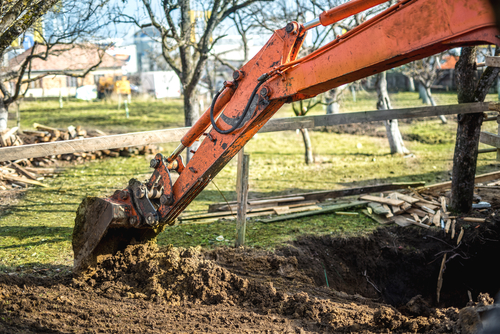Best earth moving & excavations specialists in Seshego-E, Limpopo
Top earth moving & excavations specialists near you
Browse the best earth moving & excavations experts and compare ratings and reviews.
Hire the best earthmoving and excavations specialist
Search Uptasker for the best earthmoving and excavations specialists
How can an earthmoving and excavations specialist be of help to me?
Whether you are building a completely new structure or renovating an existing building, the possibility exists that you will need to excavate trenches for foundations to be laid. Excavation is a vital component in any construction project. Even a job such as building a below-ground swimming pool will need the power of mechanical equipment which can dig deeper, faster and more efficiently than doing this by manual labour alone. Digging the trenches is one thing, but you will then be left with a pile of earth, rocks or rubble from these trenches which has to be removed from the site and disposed of elsewhere. With the help of an excavation and earthmoving specialist, these problems can easily be resolved.
When would I need an earthmoving and excavations specialist?
Some building sites are challenging from the outset, with steeply sloping ground which needs to be leveled prior to any work being planned, or piles of rubble left from a demolished building. An earthmoving and excavation specialist is the answer in such situations. This specialist contractor has the necessary heavy-duty equipment to remove sand, soil, rocks and rubble quickly and efficiently, and level the area in readiness for further development. Earthmoving equipment is, by necessity, fairly large and heavy equipment, typically heavy-duty vehicles designed for construction operations which involve earthworks. They are used to move large amounts of earth, to dig foundations for landscaping and building operations, and so on. An earthmoving and excavation contractor usually has a range of both large and smaller equipment types available to tackle any kind of job, such as small bobcats, graders, large and small excavators, backhoe loaders, bulldozers, compactors and trenchers, as well as additional attachments, for instance, buckets and grapples.
Different types of excavation
There are various types of excavation, such as :
- Topsoil Excavation, which, as the name states, involves the removal of the top layer of the surface being excavated, including vegetation, soil and any other decaying material such as rotten wood, papers, cardboard, etc.
- Rock Excavation. This type of excavation is more challenging and dangerous as it involves the use of special equipment and techniques such as drilling or blasting to remove solid large rock or other very tough surfaces.
- Muck Excavation. Muck - or mud - is a combination of soil and water which, in large quantities, can hinder construction. This is either removed from the site completely or spread out to dry for later use.
- Earth Excavation. This is a deeper level of excavation, usually used to prepare for the laying of foundations for buildings and bridges. It is also used prior to the construction of drainage ditches, and involves the removal of various layers of earth.
- Cut and Fill or ‘Stripping’ Excavation is used during construction projects to clear large areas. This type of excavation removes wide and shallow layers of topsoil, rocks, sand and other materials, often followed by grading or leveling of the land.
- Trench Excavation. For this purpose, a trench is defined as an excavated area in which the length of the excavation exceeds the depth. This type of excavation is used to bury service lines, lay foundations and install sewer systems and pipelines for other services. A shallow trench may be defined as less than 6m deep, whereas deep trenches are more than 6m deep.
- Dredging. This is water-based excavation, where sediment and debris has built up over time under water, hindering the access of boats and ships and making construction in the area difficult. This type of excavation is usually situatd near harbours or waterways.
In all of the above excavation work, it is necessary to remove the excess soil, rocks or debris which has accumulated, and this is the main reason why both excavation and earthmoving applications generally fall under the control of one specialist.
How to find the right earthmoving and excavation specialist for your needs
Check their online ratings and customer reviews
At present, it seems that the internet is used mainly to list the types of equipment used by earthmoving and excavation specialists which, although interesting, is not of much use in finding the right specialist for your needs. Nonetheless, a site such as Uptasker is incredibly useful in locating such specialist contractors in your particular area, as it lists per geographical region, as well as providing online ratings and customer reviews, allowing you to judge service levels according to previous customers. You can also check for advertisements in building, house and home magazines and catalogues, visit home expos, speak to architects and building contractors, or check the Yellow Pages and newspapers for these specialists. If possible, try to use word of mouth referrals from colleagues or friends, as you can then be sure of competitive pricing, good service levels and tidy workmanship.
Top earthmoving and excavation specialist tips

For every job that needs to be done, there is a specialist able to step up and provide the solution. You don’t have to struggle with months of hard, back-breaking manual work to clear unsightly ground filled with overgrown, tangled vegetation and tree stumps, rubble or rocks. You don’t need to agonize over digging the foundations for your new boma. Call in the specialists and then sit back and let them handle the hard work and cleaning up afterwards whilst you spend your time enjoyably planning your new garden or structure. For more tips, see our earthmoving and excavation specialist articles.
Read Earth Moving & Excavations articles